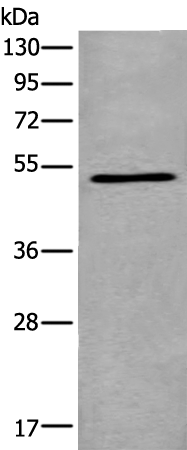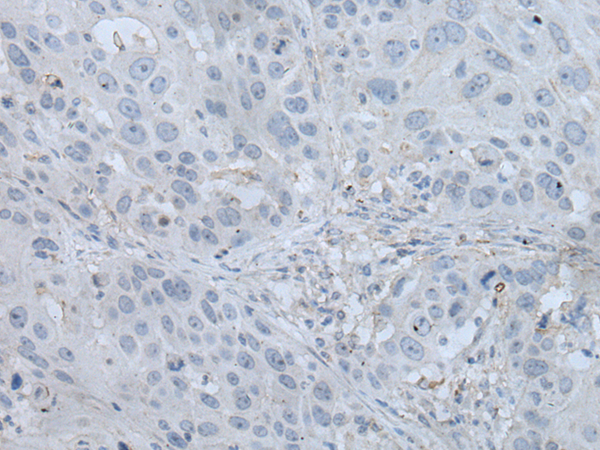

| WB | 1/200-1/1000 | Human,Mouse,Rat |
| IF | 咨询技术 | Human,Mouse,Rat |
| IHC | 1/25-1/100 | Human,Mouse,Rat |
| ICC | 技术咨询 | Human,Mouse,Rat |
| FCM | 咨询技术 | Human,Mouse,Rat |
| Elisa | 1/5000-1/10000 | Human,Mouse,Rat |
| Aliases | PLRP1 |
| WB Predicted band size | 52 kDa |
| Host/Isotype | Rabbit IgG |
| Antibody Type | Primary antibody |
| Storage | Store at 4°C short term. Aliquot and store at -20°C long term. Avoid freeze/thaw cycles. |
| Species Reactivity | Human, Mouse, Rat |
| Immunogen | Fusion protein of human PNLIPRP1 |
| Formulation | Purified antibody in PBS with 0.05% sodium azide and 50% glycerol. |
+ +
以下是3篇关于PNLIPRP1抗体的参考文献概览:
1. **"Characterization of monoclonal antibodies against human pancreatic lipase-related protein 1 (PNLIPRP1)"**
*作者:Lowe ME, et al.*
摘要:该研究报道了针对人源PNLIPRP1蛋白的单克隆抗体的开发与验证,通过免疫印迹和免疫组化证明抗体特异性,并用于分析胰腺组织中PNLIPRP1的表达分布。
2. **"Role of PNLIPRP1 in lipid metabolism and its interaction with dietary components"**
*作者:Wang Y, et al.*
摘要:利用PNLIPRP1抗体在小鼠模型中研究该蛋白在脂质消化中的作用,发现其通过抑制胰脂肪酶活性调控膳食脂肪吸收,抗体用于Western blot和免疫沉淀实验验证蛋白互作。
3. **"Autoantibodies against PNLIPRP1 as a potential biomarker in autoimmune pancreatitis"**
*作者:Okazaki K, et al.*
摘要:研究发现自身免疫性胰腺炎患者血清中存在PNLIPRP1自身抗体,通过ELISA和免疫荧光验证其诊断价值,提示该抗体可能作为疾病特异性生物标志物。
4. **"Expression profiling of PNLIPRP1 in pancreatic cancer using immunohistochemistry"**
*作者:Li J, et al.*
摘要:采用商业化PNLIPRP1抗体对胰腺癌组织进行免疫组化分析,揭示其表达水平与肿瘤分化程度及患者预后的相关性,为胰腺癌分子机制研究提供依据。
注意:以上信息为示例性总结,实际文献需通过学术数据库(如PubMed、Web of Science)检索确认。
The PNLIPRP1 antibody targets pancreatic lipase-related protein 1 (PNLIPRP1), a member of the pancreatic lipase family encoded by the *PNLIPRP1* gene. PNLIPRP1 is primarily expressed in the pancreas and shares structural homology with classical pancreatic lipase (PNLIP) but exhibits distinct functional properties. Unlike PNLIP, which hydrolyzes dietary triglycerides, PNLIPRP1 lacks lipase activity and may act as an inhibitor or modulator of lipid digestion, potentially regulating lipase activity or lipid absorption in the intestine. Its precise physiological role remains under investigation, though it is implicated in lipid metabolism and pancreatic function.
Antibodies against PNLIPRP1 are essential tools for studying its expression, localization, and interactions in research settings. They enable detection via techniques like Western blotting, immunohistochemistry, and ELISA, aiding in explorations of its role in pancreatic disorders, metabolic syndromes, or digestive diseases. Some studies suggest PNLIPRP1 may serve as a biomarker in pancreatic pathologies, including chronic pancreatitis or pancreatic cancer, though clinical applications are still exploratory. Commercial antibodies are typically validated for specificity against conserved epitopes, with cross-reactivity assessments across species. Researchers prioritize antibodies with high affinity and minimal background noise to ensure accuracy in both qualitative and quantitative analyses. Further studies are needed to clarify PNLIPRP1's mechanistic contributions and therapeutic potential.
×